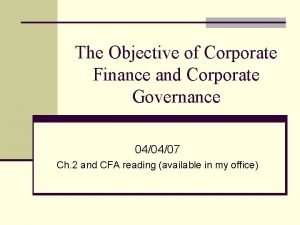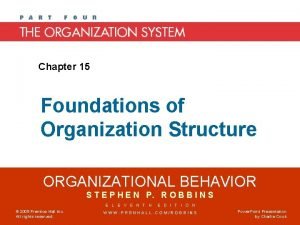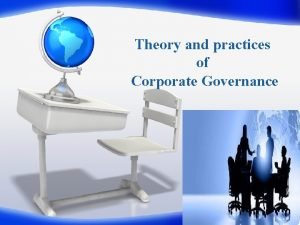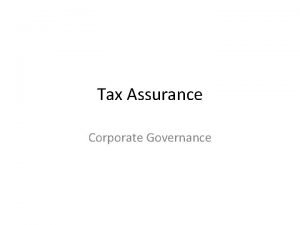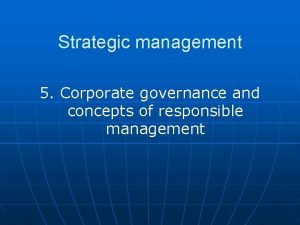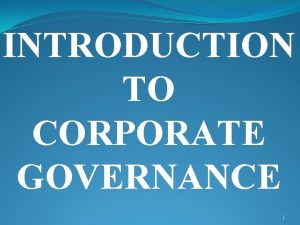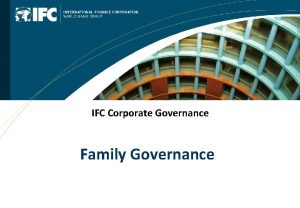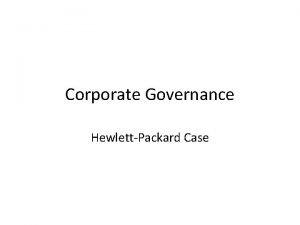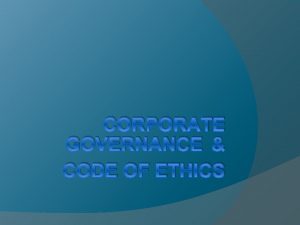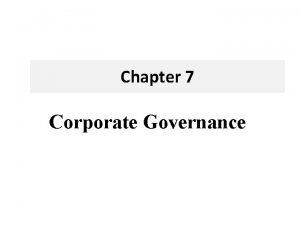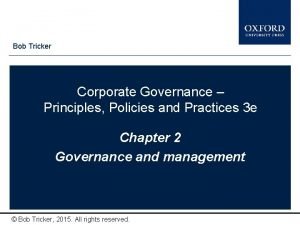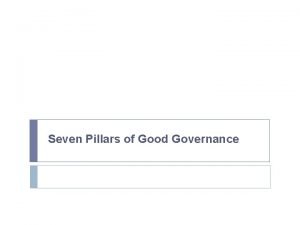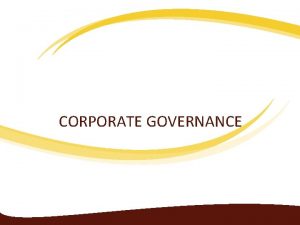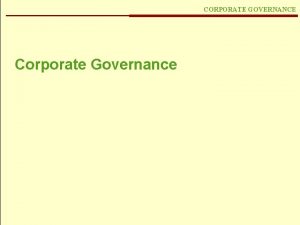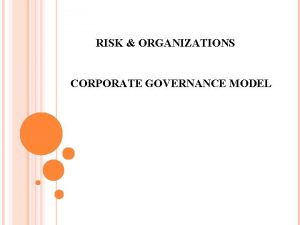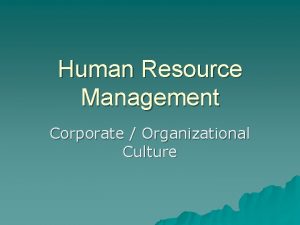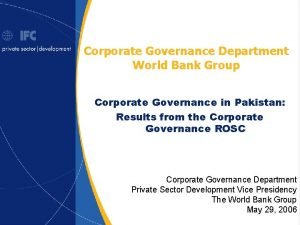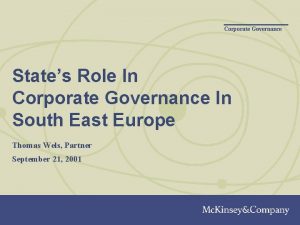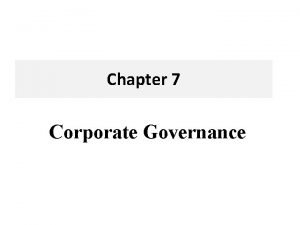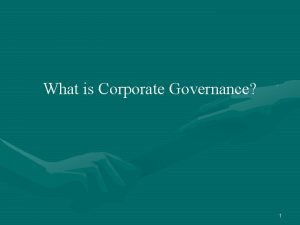Corporate Governance Organizational Structure The Structural Foundation of



















- Slides: 19

Corporate Governance & Organizational Structure The Structural Foundation of the Modern Corporation

What led to the collapse of these once outstanding companies? l Enron Boosted profits and hid debts totaling over $1 billion by improperly using off-the-books partnerships; manipulated the Texas power market; bribed foreign governments to win contracts abroad; manipulated California energy market.

What led to the collapse of these once outstanding companies? (cont’d) l World. Com Overstated cash flow by booking $3. 8 billion in operating expenses as capital expenses; gave founder Bernard Ebbers $400 million in off-the-books loans.

What led to the collapse of these once outstanding companies? (cont’d) l Global Crossing Engaged in network capacity "swaps" with other carriers to inflate revenue; shredded documents related to accounting practices.

The scandal sheet goes on and on…So what went wrong? l l l l Adelphia Arthur Andersen Duke Energy Dynergy K-Mart Qwest Xerox

Who are the major stakeholders in a modern corporation? l l l Investors Corporate executives Employees Suppliers Customers etc

What relationship does corporate governance deal with? l l Investors (via Board of Directors) vs. corporate executives Definition of corporate governance: A relationship among stakeholders that is used to determine and control the strategic direction and performance of organizations.

Why is corporate governance needed? l l Separation of Ownership and Managerial Control Agency Relationship Agency Costs (incentive, monitoring, enforcement costs, and financial losses due to insufficient governance) Product diversification as an example

How does corporate governance work? l l Internal Governance Mechanisms External Governance Mechanisms

What are the internal governance mechanisms? l l l Ownership Concentration (blockholders, institutional investors) Board of Directors (insiders vs. outsiders, diversity; strategic control vs. financial control) Executive Compensation (salary, bonuses, long-term incentive compensation)

What are the external governance mechanisms? l l Market for corporate control Executive labor market

What relationship does organizational structure deal with? l l Corporate executives vs. employees Why is organizational structure important? Strategy implementation depends on organizational structure.

What is the relationship between strategy and structure? l l l Structure for a mom-and-pop store Structure for GE The relationship: Strategy determines structure; structure affects strategy. (Chandler, 1962)

What are three generic organizational structures? l l l U-Forms (Unitary/Functional Structures) M-Forms (Multidivisional Structures) H-Forms (Holding/Conglomerate Structures)

What are the advantages of the U-Form structure? l l l Specialization Centralization Economies of scale in monitoring

As a firm grows and diversifies, what are the problems of using the U-Form structure? l l Strategic complexity/loss of strategic control Loss of accountability

What are the features of the MForm structure? l l l A Multi-divisional structure is designed to manage diversification while controlling bureaucratic costs and control-loss problems. M-Forms decentralizes operating decision-making to the business unit/division level where all necessary competitive and operational decisions are made. Strategic decision-making responsibility is retained at the headquarters level. The HQ also monitors division’s performance by using both objective market/output measures and subjective performance measures.

What is the H-Form structure? l l Holding or Conglomerate structures seek to exploit the advantages of internal capital markets Examples: Mitsubishi Samsung Tyco

Iridium Case: Group Discussion Questions 1. Did Iridium have a sound strategy in the beginning? 2. Was Iridium’s strategy well implemented as a whole and in individual functional areas? 3. What were the primary factors that led to Iridium’s failure? 4. What could have been done to prevent Iridium’s failure in terms of both strategic planning and implementation?
 Objective of corporate governance
Objective of corporate governance Foundation of organization structure
Foundation of organization structure Examples of agency problems
Examples of agency problems Corporate governance definitie
Corporate governance definitie Corporate governance chain
Corporate governance chain Strategic control and corporate governance
Strategic control and corporate governance Isu dan riset kontemporer corporate governance
Isu dan riset kontemporer corporate governance Feature of corporate governance
Feature of corporate governance Ifc corporate governance
Ifc corporate governance Corporate governance in sri lanka
Corporate governance in sri lanka Corporate governance code of maldives
Corporate governance code of maldives Hp corporate governance
Hp corporate governance P&g code of conduct
P&g code of conduct What is corporate governance
What is corporate governance Staggered board structure
Staggered board structure Scope of corporate governance
Scope of corporate governance Rule based approach to corporate governance
Rule based approach to corporate governance Four pillars of governance
Four pillars of governance Corporate governance is a form of
Corporate governance is a form of Corporate governance tool kit
Corporate governance tool kit
